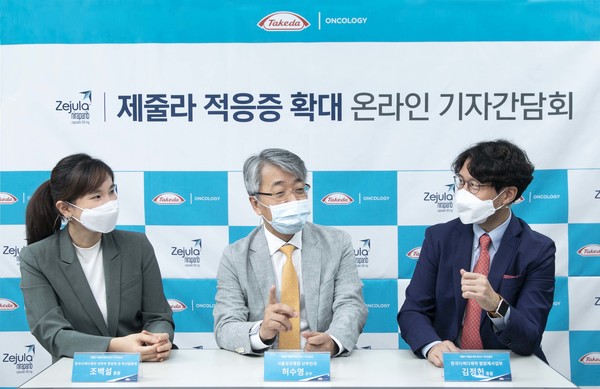Takeda Pharmaceuticals Korea held an online conference Thursday to highlight expanded indication for its ovarian cancer treatment Zejula (ingredient: niraparib) as the first-line maintenance and explained the clinical efficacy.
Zejula is the first poly ADP-ribose polymerase (PARP) inhibitor used regardless of mutation in the breast cancer susceptibility gene (BRCA).
With the expanded indication, Zejula became the first in Korea to be used as the first-line maintenance for ovarian cancer patients who responded to platinum-based therapy regardless of biomarkers such as BRCA mutations.

Zejula is characterized by its bioavailability of up to 73 percent, 36-hour long average half-life, and wide tissue distribution, the company said.
Cho Baek-seol, head of anticancer and rare blood disease business unit at Takeda Pharmaceutical Korea, explained that Zejula is the first drug that can be taken once a day among the approved PARP inhibitors in Korea, enhancing patients' convenience and compliance with medication.
Professor Antonio Gonzalez-Martin of the School of Medicine of University of Navarra, Spain, who is in charge of the PRIMA study that gives the basis for the expanded indication, presented the efficacy of Zejula found in the first-line maintenance for ovarian cancer.
In the study, patients with homologous recombination deficiency who received Zejula showed a 21.9 months median progression-free survival (mPFS), twice longer than the placebo group, and reduced risk of disease progression and death by 57 percent.
Ovarian cancer is difficult to diagnose, and the prognosis is poor, with about 85 percent of patients experiencing recurrence, Professor Hur Soo-young of Seoul St. Mary's Hospital said.
About 15 percent of ovarian cancer patients experience BRCA mutations and receive maintenance therapy with PARP inhibitors after chemotherapy. However, the other 85 percent of patients without BRCA mutations have no available therapeutic options.
"We are very pleased to provide innovative drugs to various ovarian cancer patients with primary to fourth or higher stages, through the recent expansion of the indications of Zejula," Takeda Pharmaceutical Korea CEO Moon Hee-seok said. "Takeda has been considering what ovarian cancer patients would need, such as quick drug supply, expansion of indications, and improved accessibility since we obtained the regulatory approval in March 2019."

